How to Avoid Freelance Scams and Fraud
Freelancing offers endless opportunities, but it’s not without risks. At FreelancerBridge, we prioritize your safety and success. Learn how to identify, avoid, and protect yourself from scams and fraud in the freelancing world with these essential tips and strategies.
How to Avoid Freelance Scams and Fraud
Freelancing opens up a world of opportunities, enabling individuals to work independently and connect with clients globally. However, the freelancing industry is not immune to scams and fraudulent activities, which can jeopardize your earnings and reputation.
At FreelancerBridge, we’re committed to ensuring freelancers work in a secure environment. Here’s an in-depth guide on recognizing and avoiding scams while safeguarding your freelancing journey.
1. Common Types of Freelance Scams
Upfront Payment Requests Without Proof of Work
- Scammers may demand an initial payment and disappear without delivering any work.
Fake Job Listings
- Some job offers promise high pay but redirect freelancers to fake platforms or malware-infected links.
Non-Payment Issues
- Freelancers may complete projects only to find that the client vanishes or refuses to pay.
Overpayment Scams
- Scammers overpay you and later request a refund, often with stolen payment methods.
2. Tips to Avoid Freelance Scams
Tip 1: Research Your Clients
- Verify client details, such as their name, email, and business credentials.
- Check for reviews or testimonials about the client online.
Tip 2: Use Trusted Platforms
- Work through platforms like FreelancerBridge, which offer secure payment gateways and dispute resolution services.
- Avoid accepting offers outside trusted platforms where guarantees are not provided.
Tip 3: Avoid Sharing Personal Information
- Do not share sensitive details like banking information, passwords, or identification numbers unless absolutely necessary.
Tip 4: Insist on Clear Agreements
- Always use contracts that outline payment terms, deadlines, and project deliverables.
- Avoid projects with vague details or unrealistic expectations.
Tip 5: Be Cautious With Upfront Payments
- Request partial payments or milestone-based payments to secure your earnings.
Tip 6: Avoid Overpayment Traps
- Refuse to process refunds for overpayments. Verify any unusual transactions before proceeding.
Tip 7: Use Secure Communication Channels
- Stick to professional communication channels and avoid engaging through unverified social media accounts.
3. Signs of Potential Freelance Scams
- Unusually high pay offers for minimal work.
- Clients unwilling to use contracts or escrow services.
- Pressure to accept projects immediately without proper details.
- Requests to click on unknown links or download suspicious files.
- Communication with generic, non-business emails.
4. Tools and Resources to Stay Safe
- FreelancerBridge Verified Clients: Work only with clients verified by our platform.
- Secure Payment Systems: Use escrow services to ensure payment security.
- Community Support: Join forums to share experiences and get advice from fellow freelancers.
5. Benefits of Avoiding Scams
- Financial Security: Protect your hard-earned money.
- Reputation Preservation: Maintain a strong professional profile free from scam-related disputes.
- Peace of Mind: Focus on your work without worrying about fraud risks.
- Long-Term Success: Build a reliable client base that values trust and transparency.
Conclusion
Freelance scams can be daunting, but with the right knowledge and precautions, you can navigate your career confidently. At FreelancerBridge, we’re here to help you stay informed, secure, and successful. Follow these tips, leverage our platform’s tools, and protect yourself against fraud while building a thriving freelance career.


 by Emily
by Emily




